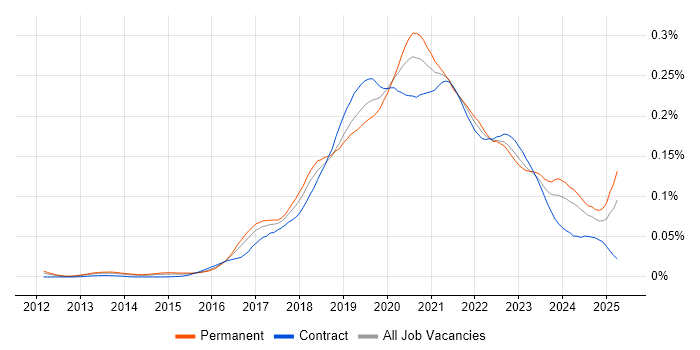Microsoft Azure SQL Data Warehouse
UK
The table below provides summary statistics and salary benchmarking for jobs requiring Azure SQL Data Warehouse skills. It covers permanent job vacancies from the 6 months leading up to 2 March 2026, with comparisons to the same periods in the previous two years.
| 6 months to 2 Mar 2026 |
Same period 2025 | Same period 2024 | |
|---|---|---|---|
| Rank | 632 | 638 | 725 |
| Rank change year-on-year | +6 | +87 | +133 |
| Permanent jobs citing Azure SQL Data Warehouse | 38 | 40 | 85 |
| As % of all permanent jobs in the UK | 0.054% | 0.086% | 0.11% |
| As % of the Database & Business Intelligence category | 0.56% | 0.47% | 0.56% |
| Number of salaries quoted | 31 | 26 | 79 |
| 10th Percentile | £61,250 | £46,250 | £37,000 |
| 25th Percentile | £70,000 | £53,750 | £41,250 |
| Median annual salary (50th Percentile) | £80,000 | £65,000 | £50,000 |
| Median % change year-on-year | +23.08% | +30.00% | -25.93% |
| 75th Percentile | £110,000 | £82,500 | £62,500 |
| 90th Percentile | £115,000 | £90,000 | £86,500 |
| UK excluding London median annual salary | £65,000 | £61,250 | £42,500 |
| % change year-on-year | +6.12% | +44.12% | -19.05% |
All Database & Business Intelligence Skills
UK
Azure SQL Data Warehouse falls under the Databases and Business Intelligence category. For comparison with the information above, the following table provides summary statistics for all permanent job vacancies requiring database or business intelligence skills.
| Permanent vacancies with a requirement for database or business intelligence skills | 6,806 | 8,581 | 15,150 |
| As % of all permanent jobs advertised in the UK | 9.69% | 18.52% | 19.29% |
| Number of salaries quoted | 4,122 | 5,035 | 11,717 |
| 10th Percentile | £35,000 | £37,500 | £35,000 |
| 25th Percentile | £43,813 | £47,500 | £43,750 |
| Median annual salary (50th Percentile) | £60,000 | £65,000 | £57,500 |
| Median % change year-on-year | -7.69% | +13.04% | -8.00% |
| 75th Percentile | £80,000 | £86,250 | £75,000 |
| 90th Percentile | £100,000 | £115,000 | £95,000 |
| UK excluding London median annual salary | £52,500 | £55,000 | £52,500 |
| % change year-on-year | -4.55% | +4.76% | -4.55% |
Azure SQL Data Warehouse
Job Vacancy Trend
Historical trend showing the proportion of permanent IT job postings citing Azure SQL Data Warehouse relative to all permanent IT jobs advertised.

Azure SQL Data Warehouse
Salary Trend
Salary distribution trend for jobs in the UK citing Azure SQL Data Warehouse.

Azure SQL Data Warehouse
Salary Histogram
Salary distribution for jobs citing Azure SQL Data Warehouse over the 6 months to 2 March 2026.
Azure SQL Data Warehouse
Top 11 Job Locations
The table below looks at the demand and provides a guide to the median salaries quoted in IT jobs citing Azure SQL Data Warehouse within the UK over the 6 months to 2 March 2026. The 'Rank Change' column provides an indication of the change in demand within each location based on the same 6 month period last year.
| Location | Rank Change on Same Period Last Year |
Matching Permanent IT Job Ads |
Median Salary Past 6 Months |
Median Salary % Change on Same Period Last Year |
Live Jobs |
|---|---|---|---|---|---|
| England | +17 | 33 | £80,000 | +23.08% | 7 |
| Work from Home | +34 | 32 | £110,000 | +79.59% | 4 |
| UK excluding London | -17 | 18 | £65,000 | +6.12% | 6 |
| London | +35 | 17 | £110,000 | +49.15% | 4 |
| West Midlands | +9 | 9 | £75,000 | +20.00% | |
| Midlands | -1 | 9 | £75,000 | +20.00% | |
| Scotland | -13 | 4 | - | - | 1 |
| North of England | -17 | 4 | £60,000 | +31.87% | 2 |
| North West | +3 | 3 | £65,000 | +10.64% | 1 |
| South East | -15 | 1 | £65,000 | +13.04% | 3 |
| Yorkshire | - | 1 | £42,500 | - |
Azure SQL Data Warehouse
Co-Occurring Skills & Capabilities by Category
The following tables expand on the one above by listing co-occurrences grouped by category. They cover the same employment type, locality and period, with up to 20 co-occurrences shown in each category:
